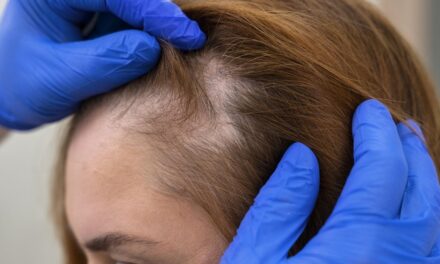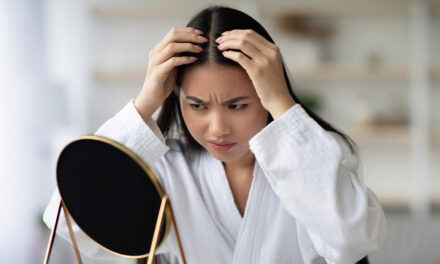
Hair loss can be a distressing experience for anyone, regardless of age or gender. Hair loss could be genetics, medication, hormonal imbalances, or nutritional deficiencies.
However, did you know that stress can also play a significant role in hair loss? Yes, stress is not only harmful to your mental health but can also impact your physical health, leading to hair loss.
In this blog post, we will explore the connections between stress and hair loss, discuss ways to prevent hair loss caused by stress, and more.
Can Stress Cause Hair Loss?
Stress can have far-reaching effects on your physical and mental health, including impacting your hair. As a result, many ask a common question: is there a connection between stress and hair loss? Yes, stress can cause hair loss; however, it may not be the only contributing factor.
Hair loss due to stress is known as telogen effluvium or TE. This condition happens when your hair follicle enters the telogen phase and rests for a few months before eventually being shed. Stress can trigger this process by pushing many hair follicles into the resting phase, increasing shedding.
Types of Stress-Related Hair Loss

Telogen effluvium
Telogen effluvium is a condition many people may not be familiar with, but it is the second most common type of hair loss that dermatologists encounter. This condition can affect people of any age and is characterized by thinning hair in patches towards the center of the scalp.
While it can be alarming to experience hair shedding, the good news is that TE does not cause permanent damage to hair follicles, and hair loss is fully reversible. The duration of hair regrowth after TE will vary depending on the underlying cause, but there is hope for those who experience this condition.
Trichotillomania
Trichotillomania (TTM) is another condition that can lead to hair loss. TTM is an impulse control disorder involving compulsively pulling out one’s hair, usually from the scalp, eyebrows, or eyelashes. This type of hair loss can be difficult to treat and can cause permanent damage to the follicles if not treated quickly. Treatment for TTM typically includes psychotherapy and medications that can help reduce the urge to pull out one’s hair.
Stress can have a devastating effect on physical health, including causing hair loss. Therefore, it’s important to identify and address the underlying sources of stress so that you can take steps to improve your overall well-being.
Alopecia Areata
Alopecia is a condition that causes patchy hair loss, mainly on the scalp. It’s an autoimmune disorder affecting approximately 6.8 million people in the U.S.
Stress is a significant contributing factor to its onset and progression. Alopecia areata (AA) occurs when the immune system attacks hair follicles.
This can lead to hair loss in round patches on the scalp or even across the entire scalp. In severe cases of AA, known as alopecia universalis, hair loss can occur all over the body.
Hair may grow back and fall out repeatedly over time. This autoimmune disease affects people of all ages and genders, with over six million people in the United States being affected.
Unfortunately, there is no known cure for AA.
Other Common Causes of Hair Loss
Did you know that, on average, a person loses around 50 to 100 strands of hair daily? This is perfectly normal as new hair constantly grows back. Although stress is often linked to hair loss, it’s not the sole reason. Several other factors can also contribute to hair loss.
- Hormonal Changes
- Genetics
- Medications
- Treatments
- Diabetes
- Nutritional Deficiency
- Hairstyles
- Radiation Therapy
Is Hair Loss From Stress Permanent?
Hair loss is a common problem many people face, and various factors can cause it. Unfortunately, one of these factors may be stress. The good news is that if your hair loss is caused by stress, it is often temporary and can be reversed.
However, it’s essential to visit a doctor to rule out other underlying causes that could be leading to hair loss. For example, if the hair loss is not due to stress, it may be permanent or require medical intervention.
Hence, taking care of your hair and being aware of any significant changes is crucial. In addition, if you can get your stress levels under control, your hair may grow back, leading to better hair health. So, keep these things in mind and make an appointment with a doctor if you notice any sudden or patchy hair loss.
Ways To Reduce Hair Loss Caused By Stress

Stress Management
Reducing stress is important to prevent your hair loss from worsening. Make time for activities like:
- yoga
- meditation
- reading
- dancing
- exercise
- therapy
It is also helpful to avoid stressful situations as much as possible.
Eat Healthy Food
A balanced and healthy diet is essential for a better hair growth rate and to feel good about yourself. Nutritional deficiencies can affect your hair growth cycle. Avoid crash dieting, malnutrition, and starvation, which can increase stress and slow hair growth.
Consume regular meals and avoid processed foods, fats, and sugars to promote hair growth. Instead, your diet includes fruits, vegetables, lean proteins, and whole grains. Keeping yourself hydrated by drinking enough water is also important.
Topical Treatments
Minoxidil (Rogaine): This medication is available over the counter and comes in a cream, foam, or spray form. It’s designed to be applied twice daily to your scalp, eyebrows, or beard. However, it’s not recommended for use on other body parts.
There are variations specifically formulated for males or females. While it’s not entirely understood how minoxidil works, it’s believed to lengthen the growth phase of hair. However, remember that results may vary; improvement could take up to four months.
Medication
Hair loss can be a frustrating experience for many people, but medication options offer hope:
Finasteride (Propecia)
This prescription medication is taken orally and works by slowing down hair loss. Patience is key when taking Finasteride, as it can take a few months to see results. However, the benefits can be retained if you continue taking the medication.
Spironolactone (Carospir, Aldactone) and oral dutasteride (Avodart):
It can also help slow down hair loss and promote healthy hair growth. Though dutasteride is not FDA-approved for treating male pattern baldness, it has been prescribed off-label successfully. Knowing your medication options can relieve and help you find the right treatment for your hair loss concerns.
When To See a Doctor
If you’re experiencing an unusual amount of hair loss and are unsure of the cause, it’s important to schedule a consultation with your doctor. They can perform tests to determine the type of baldness you’re experiencing and recommend treatments based on your diagnosis.
Additionally, they can offer reassurance that other factors may contribute to your hair loss besides severe stress. In summary, stress may be linked to hair loss, but identifying and managing the underlying cause of stress is the best way to protect your hair.
When in doubt, seek guidance from a doctor or mental health professional on controlling your thoughts, emotions, and lifestyle habits to maintain good health and happiness. Proper care makes it possible to reduce the effects of stress-induced hair loss on your hair and keep it healthy for many years.
Check out Vitamins Revive for hair growth supplements to nourish and enrich your hair, including biotin for healthier-looking locks.
FAQs
How does stress affect hair thinning?
Stress can significantly impact hair thinning and even lead to baldness in some cases. Stress can cause the body to produce more certain hormones that increase inflammation throughout the body, affecting hair production.
How can I stop my hair falling out due to stress?
The most important step you can take to reduce hair loss due to stress is to manage your stress levels. This might involve lifestyle changes such as taking time for yourself, spending time outdoors in nature, and engaging in activities that bring you joy.
What vitamins are good for stress and hair loss?
Certain vitamins can help support healthy hair growth, including B-complex vitamins, biotin, and omega-3 fatty acids. Taking a daily multivitamin can also benefit overall health and decrease stress levels.









